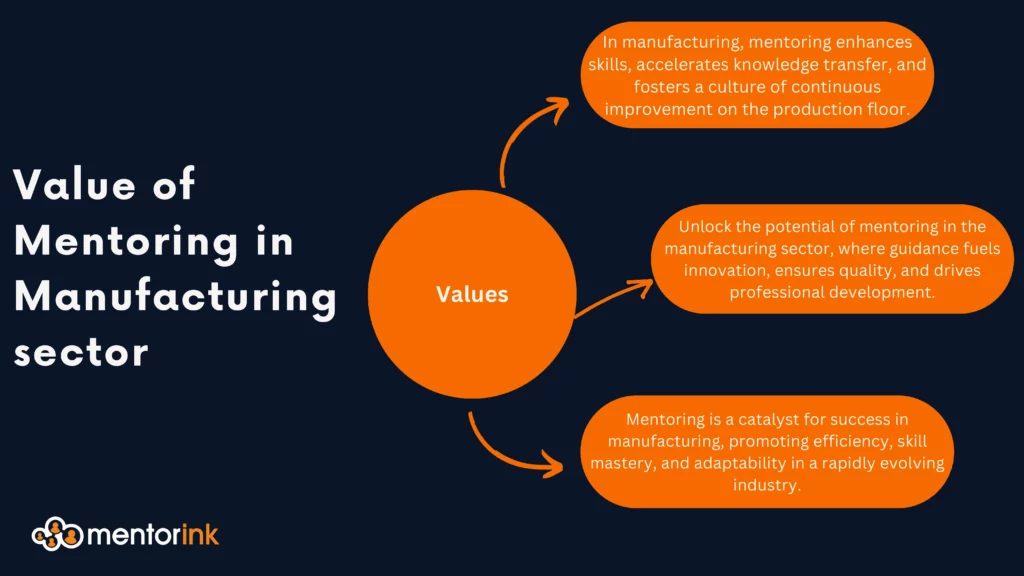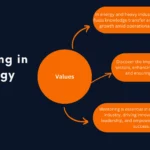
Introduction
Brief overview of the manufacturing sector 🏭
Before we discuss about mentoring in manufacturing sector let’s take a look brief overview of the manufacturing sector. The manufacturing sector is a broad category that includes companies involved in the production of goods, ranging from raw materials to finished products. This sector is critical to the economy of many countries, as it drives innovation, creates jobs, and contributes to the growth of GDP.
The manufacturing sector can be divided into various subsectors based on the type of product being produced. Some common subsectors include:
- Food and beverage manufacturing
- Textile manufacturing
- Chemical manufacturing
- Pharmaceutical manufacturing
- Automotive manufacturing
- Aerospace and defense manufacturing
- Electronics manufacturing
- Machinery manufacturing
Each subsector has its unique set of challenges and opportunities, but they all share the common goal of producing high-quality products efficiently and cost-effectively. The manufacturing sector is constantly evolving, with new technologies and processes emerging to improve productivity and sustainability.
Benefits of mentoring in the manufacturing sector
Increased knowledge transfer 💙
There are several ways in which mentoring can facilitate knowledge transfer in the manufacturing sector:
- Passing on technical skills
- Sharing industry-specific knowledge
- Providing feedback and guidance
- Encouraging continuous learning
Thus, increased knowledge transfer through mentoring can help to improve the quality of work, reduce errors, and increase efficiency in the manufacturing process.
Enhanced employee engagement and retention 🤗
Enhanced employee engagement and retention is another important benefit of mentoring in the manufacturing sector. Here are some ways in which mentoring can enhance employee engagement and retention:
- Building relationships
- Creating a sense of purpose
- Encouraging professional growth
- Providing feedback and support
Hence, enhanced employee engagement and retention through mentoring can lead to a more positive workplace culture, better employee performance, and a stronger, more committed workforce.
Improved productivity and efficiency 📈
Here are some ways in which mentoring can improve productivity and efficiency:
- Targeted skill development
- Faster problem-solving
- Reduced errors
- Increased innovation
Therefore, improved productivity and efficiency through mentoring can lead to better use of resources, higher quality products, and a more profitable manufacturing operation.
Accelerated leadership development 🏃🏻♂️
Here are some ways in which mentoring can accelerate leadership development:
- Exposure to leadership skills
- Practice in a safe environment
- Increased self-awareness
- Opportunities for stretch assignments
Overall, accelerated leadership development through mentoring can help organizations build a pipeline of future leaders, ensuring a smooth transition of leadership and continued success.
Higher job satisfaction and morale 😊
Here are some ways in which mentoring can increase job satisfaction and morale:
- Improved sense of belonging
- Increased recognition
- Opportunities for growth
- Reduced stress
Thus, higher job satisfaction and morale through mentoring can lead to a more positive workplace culture, lower turnover rates, and a more engaged and productive workforce.
Types of mentoring in the manufacturing sector
Formal mentoring programs ⚖
Here are some key elements of formal mentoring programs:
- Program structure
- Goals and objectives
- Training and support
- Evaluation and assessment
Overall, formal mentoring programs can provide a structured and supportive environment for mentoring relationships, and can help organizations achieve specific goals related to employee development and retention.
Informal mentoring relationships 🕵♂️
Here are some key characteristics of informal mentoring relationships:
- Organic development
- No set structure
- Based on trust
- Opportunities for networking
Hence, informal mentoring relationships can be a valuable source of support and guidance for employees, particularly those who may not have access to a formal mentoring program. These relationships can help employees develop new skills, gain insight into the organization’s culture, and build relationships that can be beneficial for their career development.
Reverse mentoring 🧓
Here are some benefits of reverse mentoring:
- Improved technology skills
- Increased understanding of younger generations
- Opportunities for personal and professional growth
- Increased collaboration and innovation
Therefore, reverse mentoring can be a valuable practice for organizations looking to bridge the generation gap and foster a culture of learning and development.
Best practices for successful mentoring in the manufacturing sector
Clearly defined goals and objectives 🟢
Here are some key benefits of clearly defined goals and objectives:
- Clarity
- Measurability
- Accountability
- Alignment
Thus, clearly defined goals and objectives can help to ensure that mentoring relationships are productive and effective, and that both mentors and mentees are able to achieve their intended outcomes.
Strong communication and feedback ✉️
Here are some key benefits of strong communication and feedback in mentoring relationships:
- Building trust
- Clarifying expectations
- Providing guidance and support
- Encouraging continuous improvement
- Strengthening the relationship
Hence, strong communication and feedback are essential for building strong and effective mentoring relationships, and for ensuring that both mentors and mentees are able to achieve their intended outcomes.
Training and support for mentors and mentees 📡
Here are some key benefits of training and support for mentors and mentees:
- Clarifying roles and responsibilities
- Developing skills
- Providing resources
- Encouraging continuous improvement
- Strengthening the program
Overall, training and support for mentors and mentees are essential components of successful mentoring programs. So, by providing the right resources and support, organizations can help mentors and mentees to be more effective in their roles and achieve their intended outcomes.
Recognition and rewards for successful mentoring relationships 🏆
Here are some key benefits of recognition and rewards for successful mentoring relationships:
- Motivation
- Encouraging excellence
- Public recognition
- Financial incentives
- Retention
Therefore, recognition and rewards for successful mentoring relationships can be an effective way to motivate and encourage mentors and mentees, and to ensure that mentoring programs are successful and effective. By recognizing and rewarding excellence in mentoring, organizations can create a culture of continuous learning and development, leading to better outcomes for everyone involved.
Challenges and solutions for implementing mentoring in the manufacturing sector
Resistance to change 🛡️
Here are some strategies for overcoming resistance to change in mentoring programs:
- Communicate the benefits
- Address concerns
- Provide training and support
- Lead by example
- Celebrate successes
Thus, overcoming resistance to change in mentoring programs requires a combination of communication, training and support, leadership, and celebration of successes. By taking a proactive approach to addressing concerns and communicating the benefits of mentoring programs, organizations can create a culture that supports continuous learning and development, and that is resistant to resistance to change.
Lack of time and resources ⌛︎
Lack of time and resources can be a significant barrier to implementing effective mentoring programs in the manufacturing sector. In many cases, employees may be already stretched thin with their current workload, and finding the time to participate in mentoring relationships can be challenging. Additionally, mentoring programs require resources such as training, support, and technology, which may not be readily available.
Here are some strategies for addressing the lack of time and resources:
- Prioritize mentoring
- Flexible scheduling
- Technology solutions
- Mentoring partnerships
- Utilize existing resources
Diversity and inclusion considerations 🗅
Here are some strategies for incorporating diversity and inclusion considerations into mentoring programs:
- Create diverse mentor and mentee pairs
- Ensure accessibility
- Provide cultural awareness training
- Address biases
- Encourage diversity of thought
Overall, incorporating diversity and inclusion considerations into mentoring programs requires a proactive and intentional approach. Hence, by taking steps to ensure that mentoring relationships are inclusive and accessible to all employees, and by promoting diversity of thought and understanding, organizations can create effective mentoring programs that support the growth and development of all employees.
Conclusion
Recap of the importance and benefits of mentoring in the manufacturing sector
Here is a recap of the importance and benefits of mentoring in the manufacturing sector:
- Increased knowledge transfer
- Enhanced employee engagement and retention
- Improved productivity and efficiency
- Accelerated leadership development
- Higher job satisfaction and morale
Overall, mentoring is an effective way to support employee development, improve performance, and promote a positive workplace culture. Hence, by investing in mentoring programs, organizations can ensure that their employees are equipped with the skills and knowledge they need to succeed, and create a culture of continuous learning and development within the manufacturing sector.
Call to action for organizations to implement or improve their mentoring programs.
If you’re an organization operating in the manufacturing sector, now is the time to take action and implement or improve your mentoring programs. Here’s a call to action for your organization to take the necessary steps to develop effective mentoring programs:
- Assess your organization’s current mentoring programs, if any, to identify areas for improvement.
- Set clear goals and objectives for your mentoring programs that align with your organization’s broader objectives.
- Allocate sufficient time and resources to ensure that your mentoring programs are effective and sustainable.
- Provide training and support for mentors and mentees to ensure that they have the skills and knowledge they need to succeed.
- Foster a culture of mentoring and continuous learning within your organization, where employees are encouraged to seek out and provide mentorship.
Therefore, by taking these steps, your organization can create effective mentoring programs that support employee development and contribute to your organization’s success. Don’t wait – start developing your mentoring programs today!


